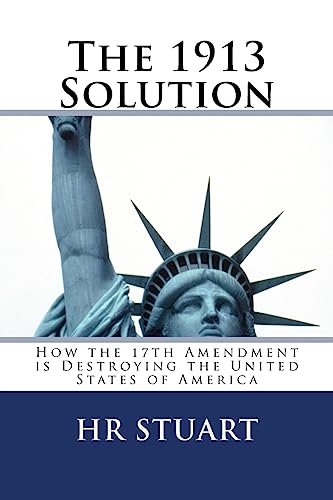The 1913 Solution
How the 17th Amendment is Destroying the United States of America
H R Stuart
BOOK REVIEW

The 1913 Solution: How the 17th Amendment is Destroying the United States of America brings forth a fierce debate wrapped in a mere seventy-eight pages of potent observations. H.R. Stuart, diving head-first into America's constitutional waters, sheds light on a change echoing through the halls of political power, one that many prefer to overlook: the adoption of the 17th Amendment. This transformative piece of legislation altered the course of American politics, and Stuart's arguments compel even the most indifferent citizen to question the very structure of their governance.
At its core, the 17th Amendment strips state legislatures of the power to elect U.S. senators, shifting this responsibility to the general populace. With this simplification of mechanisms, Stuart argues that we have witnessed a disastrous erosion of state power and representation. Suddenly, the heartbeats of local constituencies are drowned out by the thunderous roar of national elections, leading to a cascade of consequences that reverberate to this day. The emotions stirred by the author's critique call upon readers to reflect on the implications of such a drastic shift in political structure. What does it mean when the people cannot directly influence their representation? ⚖️
The context of Stuart's argument is essential. As a product of contemporary governance in America, the 17th Amendment stands as a beacon of populism, a misunderstood zeal that advocates for democratic ideals while paradoxically undermining state autonomy. Stuart doesn't just flood the reader with statistics and historical references; he pulls them into rich narratives of political missteps and power grabs that have spiraled out of control since the early 20th century. He asks you, "Can we afford to ignore the consequences of our choices?" And the answer, imbued within the text, is a powerful resounding no.
Critics of Stuart's work often focus on his perspective as overly nostalgic for a time when politics was shrouded in elitism. They argue that the changes brought about by the 17th Amendment actually democratized the system, allowing ordinary citizens a hand in governance that was previously withheld. Yet, they tend to underestimate the complex interplay between local and federal governance-a relationship that Stuart intricately dissects. The sentiments of these critics, while valid, fail to see the forest for the trees; how do we judge democracy if we are not fully represented within it? In a political landscape fraught with division and frustration, Stuart's assertions hit home like a thunderclap.
As the pages progress, your mind is ensnared in a whirlwind of visceral contemplation. Stuart does more than critique; he presents a clarion call, inviting you to explore alternate histories and futures, crafting a narrative that urges urgency in assigning responsibility back to state governance. The promise of a true representative democracy hangs in the balance, teetering on the edge of reform. This book is not just a critique; it's a provocation.
It beckons readers to confront glaring truths that many would rather remain hidden in the shadows of political discourse. The question isn't simply whether the 17th Amendment was a mistake; it's about the broader implications of how we've chosen to govern ourselves-a subject that stirs emotions of fear, anger, and resolve. 🗳
Stuart's penetrating insights draw connections to recent political upheavals and crises of representation that plague the United States today. With commentary that feels alarmingly relevant, he reminds us that neglecting these foundational questions can lead to dire ramifications-transforming our republic from one of checks and balances into an arena of chaos, where the loudest voice wins rather than the most representative.
As readers internalize Stuart's message, they can't help but feel the urgency-a perpetual sense of Fear of Missing Out (FOMO) regarding the pressing understanding of their political power. The very fabric of democracy is not just sewn together with votes but with informed voices underlining each decision made. The cacophony of despair echoed by his vivid examples is a testament to the stakes at hand.
In sum, The 1913 Solution is not merely a call to action but a deeply resonant wake-up call. H.R. Stuart navigates through the crevices of history, politics, and human emotion to lay bare the truths many fear to confront. This text will challenge you, provoke thought, and most importantly, inspire change. Will you heed the call? Dive deep into this provocative work and discover not only Stuart's insights but also the truths lurking within your own political consciousness. Embrace the challenge. It starts here. ✊️
📖 The 1913 Solution: How the 17th Amendment is Destroying the United States of America
✍ by H R Stuart
🧾 78 pages
2016
#1913 #solution #17th #amendment #destroying #united #states #america #stuart #HRStuart